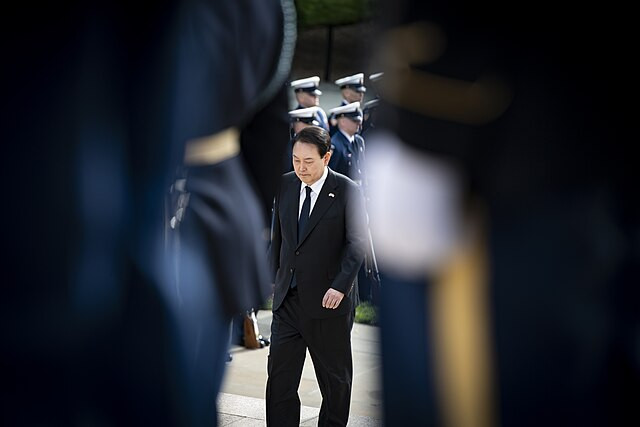South Korean President Yoon Suk Yeol declared emergency martial law in a shocking late-night televised address on Tuesday, accusing the opposition Democratic Party of anti-state activities and paralyzing the government. The announcement marks a significant escalation in the country's political crisis and has drawn sharp criticism from both political allies and rivals.
"To safeguard a liberal South Korea from the threats posed by North Korea's communist forces and to eliminate anti-state elements... I hereby declare emergency martial law," Yoon stated. He justified the drastic move as a response to what he called "a precarious state, teetering on the edge of collapse," blaming opposition forces for undermining public safety and democratic institutions.
The announcement came amid an intensifying standoff between Yoon's conservative People Power Party (PPP) and the liberal opposition Democratic Party, which holds a majority in parliament. The president accused the opposition of obstructing governance, rejecting crucial budget proposals, and turning the National Assembly into a "den of criminals."
"The National Assembly has become a monster undermining liberal democracy," Yoon said. "This is an unavoidable measure to ensure the freedom and safety of the people and guarantee the sustainability of the nation against the unrest stirred by these subversive, anti-state elements."
Yoon's declaration has raised immediate concerns about the potential impact on South Korea's democratic system. Martial law, a rare and extreme measure, grants the military significant authority to maintain order. While Yoon did not detail specific steps, he pledged to minimize inconvenience to the public, saying, "We will eliminate the anti-state forces and restore the country to normalcy as quickly as possible."
The Democratic Party has dismissed Yoon's allegations as baseless and called an emergency meeting to respond. The party described the president's actions as an "unprecedented abuse of power" and accused him of using martial law to silence political dissent and distract from scandals involving his administration.
Yoon has faced mounting criticism for dismissing calls for independent investigations into controversies surrounding his wife and top officials. His approval ratings have plummeted in recent months, further fueling political tensions.
The announcement has also drawn rebuke from within Yoon's own party. Han Dong-hoon, leader of the PPP, openly criticized the move. "The declaration of martial law is wrong," he said, adding that he would "oppose the declaration of martial law alongside the people."
The president's accusations against the Democratic Party extend to claims of sympathy with North Korea. He labeled the opposition's actions as "clear anti-state behavior aimed at inciting rebellion," citing their efforts to impeach top prosecutors and block key government initiatives.
Outside parliament, reports emerged of lawmakers being blocked from entering the building. Local broadcaster YTN TV reported that the National Assembly Speaker was attempting to convene a session, but access was restricted, adding to the uncertainty over how governance will proceed under martial law.
Yoon's critics argue that his declaration is an attempt to consolidate power amid his struggles to pass legislative initiatives through an opposition-dominated parliament.




